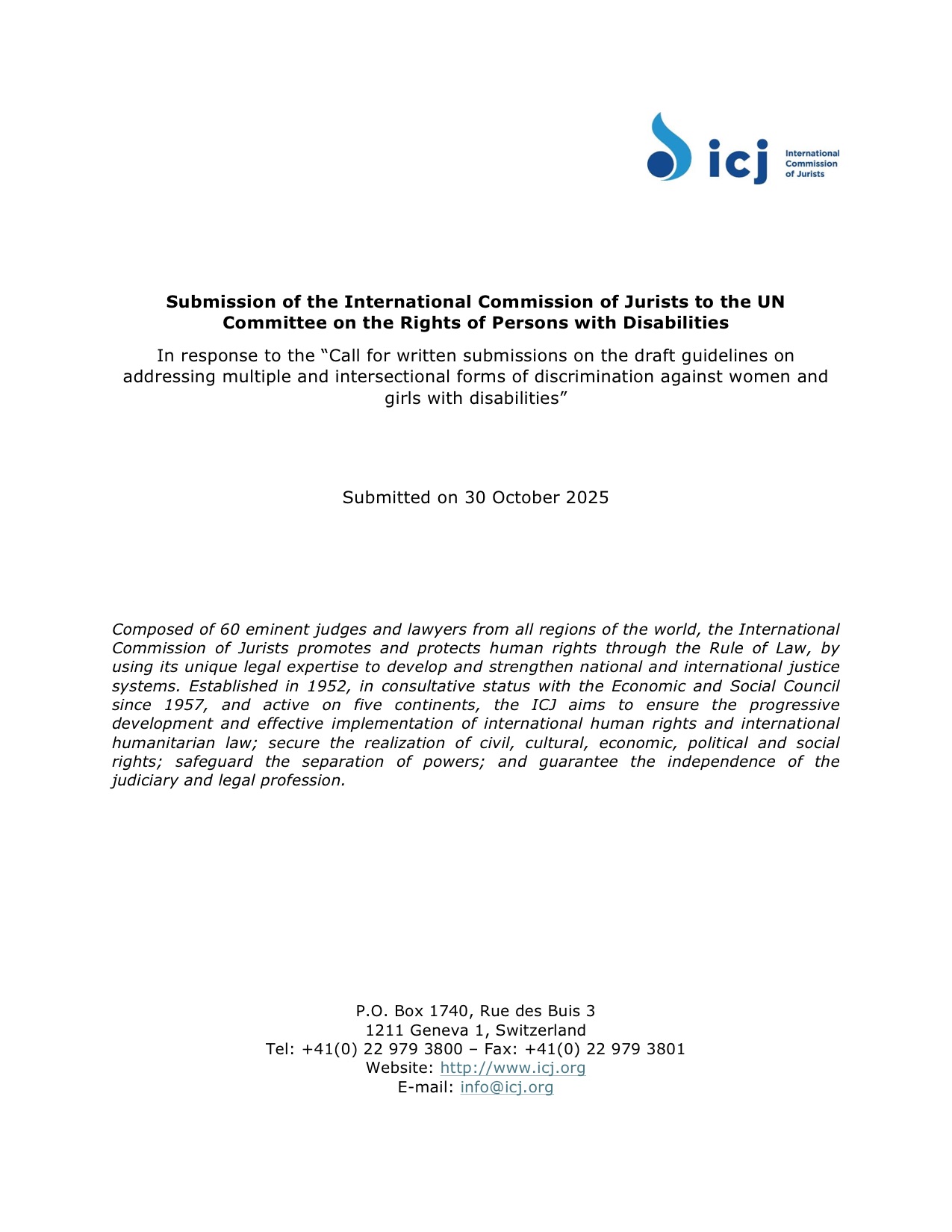The submission of the International Commission of Jurists (ICJ) to the Committee on the Rights of Persons with Disabilities (CRPD Committee) focuses on Kenya, Nepal and Uzbekistan and outlines the legal, attitudinal and systemic barriers women and girls with disabilities face in accessing justice in these countries. It notes that these barriers – alongside existing failures to provide procedural accommodations to alleviate them – result in continued discrimination, on the basis of both gender and disability, against women and girls with disabilities in the three countries. The submission responds to the CRPD Committee’s call for inputs in the context of its ongoing elaboration of guidelines to address “multiple and intersectional forms of discrimination against women and girls with disabilities”.
“Women and girls with disabilities face significant obstacles in accessing justice worldwide. These barriers generally prevent them from fully exercising their human rights and have a particularly detrimental effect on their access to justice and effective remedies in cases relating to sexual and gender-based violence”, said Kaajal Ramjathan-Keogh, ICJ Africa Director
The submission builds on ICJ’s previous work, including the Bangkok General Guidance for Judges (BGG 2022), which provides guidance to justice actors on how to address intersectional discrimination against women and girls. Further, the submission draws on ICJ’s ongoing research and advocacy in Kenya, Nepal and Uzbekistan on the application of international human rights law and standards relating to access to justice for women and girls with disabilities.
The ICJ’s submission to the Committee highlights a range of concerns common to the three countries, including:
- The high risk of sexual and gender-based violence against women and girls with disabilities, which is compounded by systemic barriers to justice.
- A wide range of persistent obstacles to access to justice for women and girls with disabilities, including: inaccessible facilities within justice premises; the unavailability of support persons, such as interpreters or intermediaries; the absence or inadequacy of procedural accommodations in the context of legal proceedings and the justice process as a whole; the continuing effect of harmful gender- and disability-based stereotypes; and economic constraints restricting access to justice.
- The particular prevalence of discrimination against women and girls with intellectual and/or psychosocial disabilities, both in law and in practice.
• The large-scale unavailability of disability disaggregated data, which undermines evidence-based policymaking, limiting the ability of the authorities to: design targeted programs; allocate resources effectively; and monitor access to justice for women and girls with disabilities.
“The ICJ applauds the CRPD Committee’s initiative of elaborating these guidelines. They should be developed with careful attention being paid to the experiences and realities faced by women and girls with disabilities throughout the world”, said Ramjathan-Keogh.
Download
ICJ Submission to the CRPD Committee can be downloaded here.
Contact
Kaajal Ramjathan-Keogh, ENABLE Initiative, Team Lead and ICJ Africa Regional Programme Director, e: Kaajal.Keogh@icj.org
Karuna Parajuli, Legal Adviser, ICJ Asia and the Pacific Programme,e: karuna.parajuli@icj.org
Petronella Mukaindo, Legal Adviser, ICJ Africa Regional Programme, e: p.mukaindo@icj.org
Sitora Raximova, Legal Consultant, ICJ ECA and Central Asia, e: sitora.raximove@icj.org
Additional Resources
- Bangkok General Guidance for Judges on Applying a Gender Perspective (BGG 2022)
- The Kathmandu Declaration on Access to Justice for Persons with Disabilities, 2024
- An Opportune Moment: Realizing the Rights of Persons with Disabilities in Africa ICJ’s study of nine sub-Saharan African States’ implementation of the Convention on Persons with Disabilities May 2025
- Access to Justice for Persons with Disabilities in Kenya: Progress and Challenges July 2025
- Nairobi Declaration on Access to Justice for Persons with Disabilities, 2025
Background
To address persistent discrimination, denial of access to justice, and harmful stereotypes against women and girls with disabilities, the ICJ, in partnership with national organizations in Nepal, Kenya, and Uzbekistan, is implementing an initiative named ENABLE to empower women and girls, including those with disabilities. A key component of this initiative is the development of national guidelines for justice sector actors in each country to strengthen their capacity to prevent and respond to discrimination against women and girls with disabilities.
The Bangkok General Guidance for Judges (BGG 2022) was initially developed for South and Southeast Asia; its principles emphasize the need for an intersectional approach to gender and disability in promoting the global relevance of justice systems free from harmful stereotypes.





